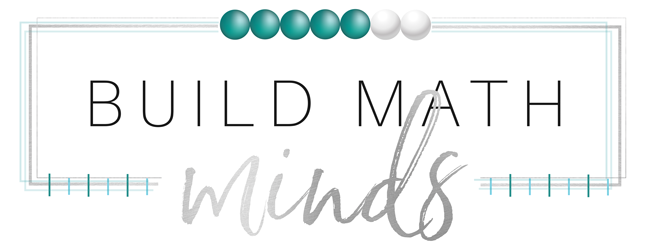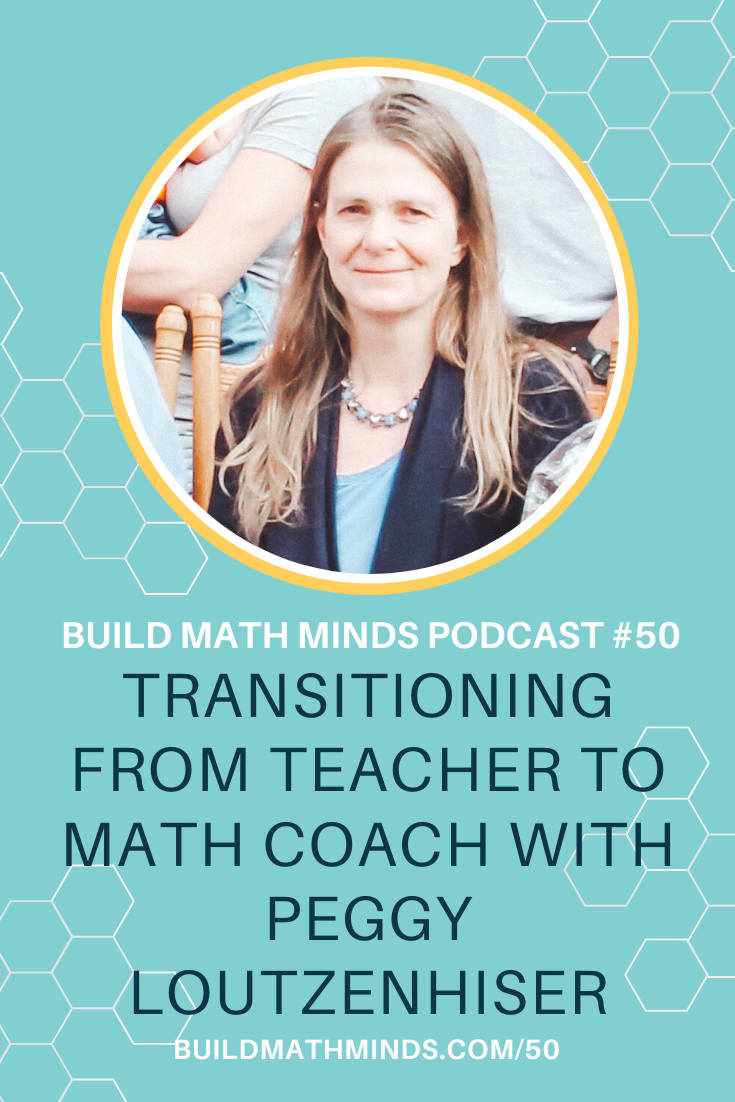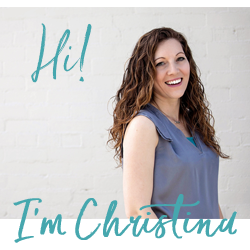Welcome fellow Recovering Traditionalists to episode 50, where we discuss transitioning from teacher to math coach with Peggy Loutzenhiser.
Christina: Well, before we jump into this interview with Peggy, I just want to remind you that I always link to any of the resources that are mentioned over on the show notes page. Peggy shares some great resources, so make sure you check out. All right. Here’s my interview with Peggy.
Christina: Well, today I am welcoming Peggy Lutzenheiser and I am super thrilled because she does not live very far from me, and we have actually met in person, which is a rarity of me working online that I actually get to meet people who I’ve had contact with. It’s so awesome to be able to know the person that I’m speaking to here today. So thank you very much for joining me today, Peggy.
Peggy: Oh, you’re welcome. I am excited to do this.
Christina: So we like to start off with having you guys tell us a little bit about your history in education, like what you’re doing now and how you got into that.
Peggy: All right. So right now I am a district math coach and I work with 4th grade through 8th grade math teachers. I started out as a teacher in the district and then I joined a national science foundation grant called MMRE, which was Making Mathematical Reasoning Explicit. And I learned a lot on how to get to the conceptual part of math instead of just teaching procedurally through them. And then … Oh, go ahead.
Christina: No. Oh, go ahead. I jumped right in when I shouldn’t have.
Peggy: No, that’s okay. Then the district, they saw the work that I was doing in my classroom and they said, “Hey, we’re thinking about a math coach position. Do you think you could apply?” And I did, and here I am.
Christina: How long have you been doing that, did you say?
Peggy: This is my fifth year as a math coach.
Christina: As a math coach. That’s awesome. So actually that led in perfectly to the next question I typically ask, which is what professional development that you’ve done that’s changed your understanding of the teaching of mathematics. I’m really excited for you to talk about MMRE because it is a very powerful program. So tell us a little bit about the professional development, what you learned and a little bit of how that’s changed your teaching.
Peggy: Well, what I’ve learned truly is to get to the deep down understanding of the math and to take the kids, have them talk about their reasoning. Whereas before I kind of explained things to them and they didn’t develop their own reasoning.
Christina: Yeah.
Peggy: Yeah. I learned how to get them started and to look for … to ask questions, to encourage the reasoning and just kind of let them struggle. Because I used to just step in and take that struggle away from them. And how it changed for me is, well math, I actually started teaching less content deeper but not not like jumping from one lesson to the next lesson to the next lesson. We sort of slowed everything down and just worked on understanding for the kids. So that’s my … and then MMRE trained me to be a leader in a rural school district.
Christina: That is a big piece of where we live, is the rural school districts are … it’s a different thing and how to be a leader in those areas where a lot of people … I get to see the gamut of things where there’s states who have 1300 coaches in their state and around here, we still have some districts that are one room school houses and it’s totally different setup and having support when you’re in those settings is very different.
Peggy: We have one school in our district that has something like 36 kids. They have 3 teachers, but one teacher is teaching 4th, 5th and 6th grade all at the same time.
Christina: Yeah. It’s a very different setup. So I’m glad that that’s part of the professional development because it’s not always just about the mathematics that we’re teaching, right? I mean sometimes we need the other side of it, the coaching piece of how do we actually implement this stuff.
Peggy: Yes, and without that kind of training, knowing how to do the math and help the kids doesn’t mean you can help the teachers. So I needed that training.
Christina: It’s definitely a hard spot to be in when you’ve been this really successful math teacher and then they go to ask you to now help everybody else out. Just because we know how to work with kids doesn’t always necessarily mean we know how to work with our colleagues in helping them with that. So can you give some advice in that area too, of things that … A lot of times we talk here about how it’s changed in your personal teaching with kids, but I think that this would be a good one to talk about how does it change when you’re trying to teach teachers? When you take the stuff that you’ve learned and trying to help your colleagues make a change?
Peggy: Well, there’s a couple pieces in there. When you teach your kids, you decide what you’re going to do and you go in and you help them learn it. When you’re working with teachers, it really has to be collaborative. So you go in and you have that end goal in mind, but there’s a lot of problem solving and I’m not talking about necessarily math problem solving, but problem solving with the teachers to make it work for them and to get the conceptual piece of the math. And every teacher is so different, you have to learn how to really listen and make your coaching work for them.
Christina: I mean, there’s so many parallels too of how we talk about how the teaching of math should be nowadays. It shouldn’t be us standing up there telling them what to do, right? But then yet the professional development sometimes is that exact thing. We stand up there and tell them what to do, right?
Peggy: Yes.
Christina: And we give them kind of this one size fits all thing. But even as professional developers, we need to differentiate our professional development and meet them where they are. Because not everybody as a teacher is in the same spot, and their willingness to change and them wanting to change their understanding of the mathematics, all of that stuff.
Peggy: Well, and even their previous experiences. If they’ve worked with a coach that didn’t go well for them, then they come with preconceived ideas. So it’s all about developing trust between you and your teachers and being able to make mistakes. I make them all the time, but them being comfortable with that too. It’s just different. But none of my teachers … When I had a classroom, I had behaviors. I have amazing teachers. I am probably the luckiest person in my district because everybody I work with is great.
Christina: That makes it very fun, doesn’t it?
Peggy: It does. It does.
Christina: Yeah. So let’s flip back, I guess, to the role of a teacher and one of the things that helps us, even when you’re working with other teachers and wanting them to change is to tell stories, right? When you can visualize what it looks like to have this … just the goal of having our students really have those light bulb moments, all of those kinds of things and how that can happen when we change our teaching of mathematics. If you are visualizing what you’re teaching of mathematics is now and you visualize what you want it to be like, it’s sometimes hard to think about how I’m going to get there.
Christina: So I love being able to share stories with other teachers about what it looks like when we do change our teaching. So do you have a specific story of when you made a switch in your teaching and how that impacted the student learning?
Peggy: Yes, I do. So I started … Through MMRE they kind of started us doing number strings and choral counts and that’s where we started and getting the kids to talk about the reasoning. And I had this amazing girl who came into my classroom and her mom said she is horrible at math. She can’t do math. That’s her bad subject. The child didn’t even want to do math, but through choral counts and strings and then working on … the last half of the year working on them actual problem solving where they had to delve in and struggle a little bit, that girl became the top of my class and when I talked to her 7th grade teacher and her 8th grade and 9th grade, they all said that she was this shining star in math, just because we took the time to talk about math instead of just giving her assignments. It was amazing.
Christina: Yeah. I love to … In our education state right now, it’s just such a focus on getting kids to perform. It’s testing season right now when we’re recording this and all of that focus is a lot on how they are performing on tests, but so much of it around the teaching of mathematics cannot be assessed. Right? Just the love of math and wanting to continue doing mathematics and that is such a huge piece that switches when we change our teaching in a way that is more focused on the helping kids develop their problem solving and dig deep into things and not just be calculators.
Peggy: So I can give you a sample in our … at Priest River Elementary where I’m at most of my time. Last year I was in a second grade class and the kids were delving into a problem and it became time to go to PE and they all booed the teacher when she said they had to stop and go to PE. And then they asked if when they got back from PE if they could just finish their math.
Christina: Isn’t that like … That just gives me goosebumps. Seriously. I’ve got the hair standing up on my arms because that’s what you want to see with everything, right? If kids are upset when the lesson is ending, then-
Peggy: There’s something good going on there.
Christina: Yeah.
Peggy: Our 4th grade teacher last year gave a survey, and so in 4th grade we have one teacher who specializes in math. So she does all 4th grade kids. So she gave them a survey on what is their favorite thing about school, and some of them said PE and some said recess, but a little bit over 50% of the kids said their favorite thing about school was math.
Christina: Wow.
Peggy: So we’re seeing a huge change in the attitude about math.
Christina: Man. Oftentimes we’re … with kids who struggle, they don’t want to continue doing it, and the only way we get better at something is by continuing to try and build our understanding. Yet, even as adults, if we don’t like something, we don’t continue to do it. We have the option for that. Our students don’t. They have to continue doing math every single year. So let’s make it fun for them, especially those kids who are struggling. Let’s make it fun so that they actually enjoy doing it. And the more that they enjoy it, the more that they’ll want to do it, thus that will breed them doing better the more that they do it.
Peggy: Well there’s this speaker, a math speaker, who said in a number sense class, that number sense is caught, not taught. Yeah, you know who I’m talking about. Anyway, I think sometimes math has to be caught, not taught. Not just number sense, but that excitement. You have to have games and activities and make it fun.
Christina: I agree. And for those of you who don’t know, that’s my line. I say it a lot. Number sense can’t be taught, it’s caught. And I actually have changed it a lot to just math. You’re right, it’s all of math. It can’t be directly taught. We have to just help kids catch it through their experiences, through our love of mathematics and through play based activities is the number one way to do it. So I’m going to jump into our last question here, which is always what is one thing that you suggest people just try out if they’re wanting to make a small change? Because change can often be difficult. So if there’s just one thing that you can suggest that people try implementing in their classroom to make this change, what would it be?
Peggy: The one thing I would suggest is some sort of number talk and it doesn’t have to be just Sherry Parish’s number talks. It can be guess my rule. It can be choral counts, it can be strings and be whatever. But 5 to 10 minutes every day of some sort of routine where the kids are talking about their reasoning and solving math mentally and not on paper. It really gets them started in that conceptual stuff.
Christina: I love it. Yep. I think that you hit it on the nose there. So we will end with that, and I will end by saying thank you, Peggy, for sharing your story and giving us some ideas of how we can build students’ math minds in a fun way that helps them learn to love mathematics.
Peggy: Well, thank you, Christina.
Subscribe and Review in iTunes
Hey, are you subscribed to the Build Math Minds Podcast, yet? If you’re not, make sure to do that today because I don’t want you to miss any episodes! Click here to subscribe to the podcast in iTunes.
While you’re there, don’t forget to leave a review on iTunes too. I would love to know your thoughts and how we can make sure that we give you content that you will really enjoy.
To leave a review, head over to iTunes and click on “Ratings and Reviews” and “Write a Review.” I can’t wait to hear your thoughts about the podcast.




